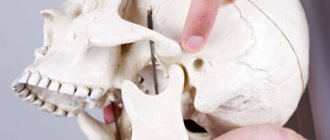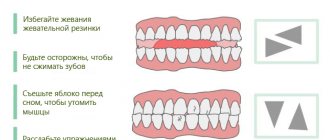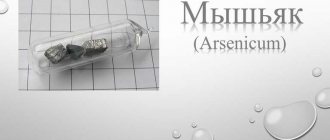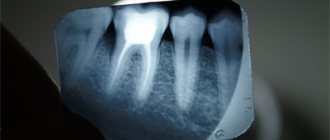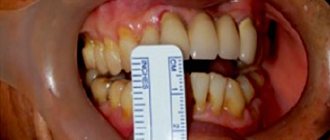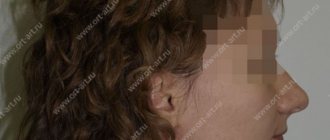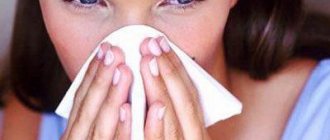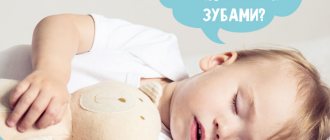The joints of the lower jaw are located in such a way that allows it to be mobile. Clicking during jaw movement is a common symptom that brings discomfort and anxiety to the patient about his or her health.
Clicking can occur when making any movement - yawning, talking, laughing, or even during singing or emotional conversation. This symptomatology refers to diseases of the temporomandibular joint and does not depend on the person’s age.
If clicking occurs, you should immediately contact a medical institution for qualified help, because a click is just a symptom, but a dangerous pathology may be hidden behind it - overload of the joint, the development of a disease of infectious etiology, or damage to ligaments or joints.
Reasons why your jaw clicks
Clicking sounds in the jaw are a direct indicator of joint injury and indicate that the joint has undergone subluxation or complete dislocation.
This disease mainly occurs when the ligaments that allow joint movement are weakened or stretched. Because of this, they are no longer able to maintain the joint in the correct position, and it jumps out of the socket, which leads to an unpleasant crunching sound near the auricle. Basically, the location of the crunch and pain is one side of the skull.
Doctors have named a large number of reasons leading to jaw crunching, including diseases and external factors.
Why is there a crunching sound?
There may be several reasons for the crunch:
- Sometimes it is simply a physical feature of a person that is inherent in him from an early age in life. Crunching occurs when the jaw muscles work hard. Individuality can be expressed not only in the structure of bones, but in the condition of muscles. With their greater extensibility and elasticity, caused by a decrease in muscle tone, they weakerly fix the jaw joint. This leads to clicks and crunches. If such a phenomenon is not accompanied by other syndromes, then there is nothing to worry about.
- This phenomenon is also observed in children and is explained by the active formation of the bone apparatus. At the same time, in childhood, crunching can occur not only in the jaw joints, but also in other joints. In some cases, the growing skeletal system lacks synovial fluid, which absorbs movement at the junction of the bones. To eliminate such manifestations and help the developing organism, having previously ruled out clearly pathological conditions, you can take drugs that help the synthesis of softening biological material.
- If the jaw joint crunches, among other things, this may be a sign of more serious pathologies, such as rheumatoid arthritis and arthrosis. The disease is characterized by inflammatory processes in the osteochondral tissue that occur as a result of infections, injuries or complications after surgery. Along with TMJ (temporomandibular joint), the disease can affect the shoulder joint, elbow or knee. Symptoms are complemented by muscle stiffness, noticeable swelling and pain.
- Crunching can also be explained by dental features or defects. Clicking in the jaw joints can be a consequence of malocclusion, which is formed in the womb. In the absence of timely correction, such pathology will be noticeable in the functioning of the joints. In addition, this problem affects the condition of the teeth - molars and incisors are subject to excessive grinding.
Arthrosis of the temporomandibular joint According to doctors, crunching and clicking in the jaw appears when the tonsils are enlarged or inflamed.
Adenoids and inflamed tonsils make breathing and swallowing difficult, forcing a person to keep his mouth open, which leads to displacement of the TMJ, chin and characteristic sounds in the jaw joints. Chronic tonsillitis or adenoids may be an indication for tonsil removal. When determining the causes, the circumstances accompanying the occurrence of pathological sounds are taken into account.
Crunches when you open your mouth
If you hear a crunching sound when you open your mouth wide, this may indicate that the jaw joints are not working correctly. When the lower jaw moves, it moves incorrectly. This symptom is often accompanied by increased sensitivity and grinding of teeth, facial muscle spasms, or headaches.
Subluxations of the lower jaw; injuries, sometimes complicated by inflammation; dental problems affecting individual teeth and the entire oral cavity - all this can happen when a person, with his mouth open wide, bites sharply, for example, on an apple, or yawns.
Skull trauma
When chewing
If you notice a crunching sound in your jaw when chewing, then this symptom may also be a consequence of muscle spasms, injuries, or joint pathologies associated with inflammatory processes.
Arthritis of the temporomandibular joint is another likely cause of extraneous noise in the jaw. The disease can be caused by viruses and bacteria of various origins, be part of a complex rheumatoid lesion of joint tissue throughout the body, or be a consequence of bruises.
Crunching in the joint accompanied by pain
The symptoms discussed are certainly a reason to think about your health, because in some cases you cannot do without consulting a specialist.
A crunch when opening the mouth, especially if it is accompanied by pain, requires attention and a therapeutic approach. Even such a small sign, noticeably appearing from time to time, may indicate systemic disorders. Pain that occurs in the TMJ when eating, talking, or yawning can be transmitted to the occipital and cervical region, which sometimes causes dizziness and headaches. With different muscle tone on the left and right sides, facial asymmetry gradually develops.
While eating
Crunching and clicking sounds when eating are especially unpleasant. The reason for the appearance of such a symptom can be seen both in the physical characteristics of the facial bones and muscles, and in pathological phenomena affecting musculoskeletal tissue. Pathology can affect the condition of the teeth, in particular, tooth enamel; the quality of chewing food, and therefore on digestion in general.
In other cases, the etiology of muscle dysfunction and TMJ is neurological in nature or is an undesirable result of dental or orthodontic procedures. All this requires high-quality treatment and qualified correction.
From the left side
If you feel a crunch on the left side, then with a high degree of probability this indicates improper functioning of the left temporomandibular joint. This unnatural sign of dysfunction appears with any movement of the lower jaw. Pain, which may not be felt at rest, manifests itself with muscle activity or pressure. This syndrome can radiate to the ear apparatus (sometimes the phenomenon is accompanied by noise), teeth, and the back of the head.
On right
Dysfunctions, including those due to inflammation, of the right TMJ respond with a crunching sound on the right side. When eating, speaking, etc. the joint clicks and hurts, the mouth does not open completely. Inflammatory processes become noticeable by redness of the cheekbones and cheeks on the outside.
Possible diseases
The list of diseases that can cause jaw clicking is quite extensive:
- Arthritis - its development is triggered by bacteria, viruses or fungi present in the patient’s body. A swollen joint prevents the mouth from opening fully, and every movement is accompanied by pain. Ultimately, the joint seizes, causing clicks to appear.
- Jaw injury - the joint may come out of its socket if struck with sufficient force.
- Advanced caries - if a person has developed caries to a severe form that requires immediate treatment, this can also cause stress on the joint. The crunch is localized on the side of the jaw where the diseased teeth are located.
- Mesial bite - an incorrect bite with the jaw pushed forward puts a colossal load on the joint.
- Bruxism is teeth grinding. This disease poses a threat to tooth enamel, ligaments and joints.
- Convulsions - accompany epilepsy, encephalitis or rheumatism. If the jaw closes too tightly during a seizure, this can also lead to prolapse of the joint process.
- Thyroid disorders - improper metabolism can be a catalyst for weakening or spraining of ligaments.
- Infectious diseases - if complications arise after an illness, this may well be the cause of clicking in the jaw.
Prevention
TMJ disease is preventable (table). This is much easier than treating it.
Table. How to protect the mandibular joint from inflammation:
| Measure | A comment |
| It is important to ensure oral health. Do not delay prosthetics, get rid of malocclusion, if any. |
| If the spine is curved, this will affect the activity of the neck muscles, which will cause movement disorders in the joint. Therefore, it is important to monitor the correct position of the spinal column. |
| People often clench their jaws too tightly during emotional experiences, which can cause excessive tension and unnecessary injury. |
| With a lack of vitamins or minerals, the functioning of many organs is disrupted. This also applies to joints. |
| Certain problems can arise if you eat a lot of rough food that is difficult to chew. This creates additional stress on the TMJ. |
Other reasons
However, even if a person is completely healthy, jaw clicking can also be caused by extraneous factors, such as:
- Stress or depression - spasmodic muscle contraction, leading to jaw clicking, can be triggered by a person’s emotional overstrain;
- Overload of the masticatory muscles - if a person often eats solid food, and also chews it on one side, then there is a high risk that the articular ligaments will become overstrained, and the articular process will jump out of the cavity;
- Consequences of treatment at the dentist - if the filling is installed or polished incorrectly, if inappropriate braces or dentures are selected, this can also cause constant clicking of the jaw;
- Physical activity - overload or lifting heavy objects provoke tension in the facial muscles and, as a result, cause TMJ dysfunction;
- Long-term loads on the jaw - if a person’s activity is related to singing, reciting poetry, or oratory, he also falls into the risk group. Children are most often susceptible to such consequences, because their ligaments are still unstable; it is extremely rare in the adult population.
The cat grinds its teeth: why and what to do?
Close pets, one way or another, become full-fledged members of the family. Any new changes in their behavior or the sudden appearance of symptoms of certain diseases are causes of concern for the owners.
A cat's grinding of teeth is hard to miss from the first day a kitten arrives in the family.
“Adoptive parents” this sound makes you wonder - is this normal? Veterinarians regard the current symptom as a normal behavioral response or manifestation of disease.
The general condition of teeth is one of the indicators of the overall health of representatives of the cat family. Pets may not get sick at all, but their various pathological processes lead to disruption of other organs and systems of the body.
Breadcrumbs, as an element of the digestive system, take part in the direct nutrition of cats. Through them, pets capture food, thanks to which it enters the oral cavity. This is where the digestion process begins. Any disturbances in the structure of teeth and the functioning of the jaw apparatus lead to inadequate absorption of nutrients and other necessary elements.
Many times, cats' tooth enamel deteriorates when fed exclusively dry food. But you cannot constantly reproach the animal with exclusively soft food, as the jaw apparatus will also deteriorate. The optimal solution in this case is a good little alternation of hard and soft food in the daily diet.
Grinding in the era of eating
Most often, cats grind their teeth while eating food. Animals usually remain hungry, but the intake of any type of food is accompanied by a living sound. This is also observed when lapping water or other liquids.
Inadequate creaking associated with chewing movements is usually a consequence of the following phenomena:
- Inflammatory matter in the oral cavity. Biting or chewing in a certain area of the mouth can cause pain, which is why the pet spares this part and tries to put all the stress on a healthy place.
- Subluxation of the jaw. In this case, the creaking appears the second the tongue sticks out. Joint failure is accompanied by an atypical sound.
Bruxism i.e. a symptom of a disease
In medical practice, both humans and animals, (for) gnawing the term “bruxism”, meaning a creaking sound unrelated to food intake.
You can stir up your cat's mouth yourself using a flashlight. It is necessary to pay attention to the condition of the enamel, gums, and examine the progress of the dentition.
When anomalies are detected, as well as in their absence, it is strongly recommended to seek the help of a veterinarian.
Veterinary dentistry describes several types of pathological conditions of teeth in cats:
- Unequal forging of the front teeth or incisors. Practically does not occur in yard, outbred cats.
- Incomplete dentition is a natural feature of some purebred cats.
- Disturbances in the change of teeth from milk teeth to molars. In such cases, milk teeth interfere with the eruption of molars, from which the latter become inflamed and rot.
- Malocclusion is incomplete closure of teeth, leading to various problems.
- Excessive canine picking causes cats to open their mouths wider, which increases stress on the jaw and causes creaking.
Bruxism is necessarily accompanied by pain. If you intend to help an animal with one of the problems described above, you need professional help. This usually includes dental work and painkillers.
Voltage
The negative impact of stress factors leads to the fact that even a person sometimes clenches his teeth. Cats also have this conditioned protective glow.
A stressful release of adrenaline leads to muscle contraction aimed at maintaining the survival of the body. Pets are also susceptible to such reactions; muscle spasms may occur a little later.
Many factors can cause stress for the feline family:
- Long absence of the owner to whom he is attached (God's.
- New pets for the family.
- Fright.
- Seasonal sexual desire and dissatisfaction of this need.
It is difficult to say to what extent each cat is susceptible to these factors. Breeds obtained through artificial breeding are considered to be more susceptible to nervous strain. Accordingly, through. Ant. Their risk of bruxism is also lower.
The help of a veterinarian in these cases consists of establishing a diagnosis and prescribing sedatives. As far as possible, the owners should provide protection from negative influences to the cat.
Helminthiasis
Teeth grinding in the human population is commonly associated with worm infestation. Often, bruxism in representatives of the cat family is also associated with helminths.
The severity of the squeak depends on the number of parasites and local immunity in the cat’s intestines. Severe auto-infection with many parasites causes distension and itching in the digestive system, causing rough chattering and grinding of teeth.
Infestation is aggravated by metabolic disorders, lack of minerals and vitamins, which can lead to more serious problems with the cat’s health. Parasites living in the intestines of cats can also affect other organs, migrating throughout the body.
The helminthic misfortune of the heart, brain, and liver of animals is dangerous for the life of a pet.
Annual prevention of helminthic infestation is recommended for pets, regardless of whether they go outside or not. Preventive measures are carried out using medicines that are freely available in veterinary pharmacies.
In any difficult cases related to changes in the behavior of cats, that is, (i.e.) cats, it is recommended to seek advice from a veterinarian.
: old cat problems
Source: https://zdavnews.ru/koshka-skripit-zybami-pochemy-i-chto-delat/
Negative consequences
Clicking the jaw can cause a wide range of unpleasant consequences:
- Dislocation, fusion, deformation, as well as complete destruction of the damaged joint;
- Articular disc tear;
- Neuralgia of the facial muscles;
- Cellulitis is a purulent inflammatory process localized in the temporal region. Will require opening and cleaning;
- Post-traumatic arthrosis;
- Inflammation of the meninges and sepsis.
Many of these consequences threaten to lead to disability or death, so at the first unpleasant symptoms you should immediately seek help from a qualified specialist.
First aid
If pain and discomfort in the jaw are taken by surprise, you can find help in traditional medicine that will help relieve discomfort:
- Hot compresses to relax muscles. They should be used if the cause of pain is arthrosis. It is necessary to take hot water into a bottle and apply it to the sore spot, after wrapping it in a cloth to avoid burns;
- Cold compresses relieve pain and swelling well; they are used if the joint is inflamed. It is necessary to apply a towel soaked in cold water for fifteen minutes, and then take a break for one hour;
- Herbal infusions - healing decoctions of sage, chamomile or calendula will perfectly cope with pain and relieve inflammation. Applied topically.
Traditional methods of treatment are good, they help to temporarily feel relief, but still are not a full-fledged analogue of traditional medicine. Therefore, you should not take risks and self-medicate in the hope that the disease will go away.
At the first opportunity, you should seek qualified help from a dentist-surgeon, and until then, take care of your jaw - do not eat rough food and do not open your mouth too wide.
Which doctor should I contact?
A gnathologist specializes in the treatment of diseases of the lower jaw, however, such a specialist cannot be found in every hospital. A dentist can be an excellent replacement.
However, if clicking in the jaw is accompanied by other diseases, you will need to consult the following specialists:
- ENT - in the presence of infectious diseases of the oral cavity;
- Neurologist - if neuralgia or inflammation of the spine is present;
- Psychologist - if a joint spasm is provoked by prolonged blues or depression of a person;
- Dentist - will be required if caries develops in the oral cavity or there are fillings that need to be replaced with new ones;
- Orthodontist - this specialist should be contacted if the patient is diagnosed with an incorrect bite, or has problems with braces or dentures.
Cracking in the ears - causes and treatment
Such a moment as a cracking sound can occur in the hearing organ of every person. Usually it goes away as quickly as it appeared. But there are times when you need to take a closer look at such a symptom. Since it may indicate the onset of a serious illness .
In themselves, all inflammatory or infectious diseases are unpleasant. doubles this sensation
Crackling in the ear is not a dangerous inflammation. It is believed that this is a minor deviation from the norm in the body. The cause of this phenomenon may be sulfur plug.
If hygiene is poor or, conversely, if cleansing is too thorough, you can push the sulfur deeper, where sulfur accumulations form over time.
One of the side effects is a crackling sound in the ears. But this is the most harmless thing that can happen to your health.
Since the accumulation of earwax provokes many diseases, including hearing loss.
In addition to wax plugs, the following diseases can cause cracking in the ear :
- Disease of the nose and pharynx. This is a common respiratory disease. The most common pathogen is infections that enter the throat through the nasal cavity.
- Severe fatigue.
- Lack of sleep also negatively affects physiology.
- When flying or driving in mountainous areas.
- Rapid change in blood pressure.
Pay attention to whether there is crunching in both ears or only in the water one. In the second case, this may be caused by a side effect after taking medications.
If there is a cracking sound in the ears when swallowing, the reasons lie in the facial joint.
Most often, crackling occurs due to domestic reasons rather than biological ones.
Cracking in the ears goes away quickly, but if it continues for a long time, consult an ENT doctor to identify the exact causes.
Cracking can be a symptom of inflammation in the ears. Infectious diseases can develop in a very short time. Then the cracking will be accompanied by pain, purulent discharge and headaches or temporal pain. Because of this, a person may have decreased hearing or even go deaf.
If you notice fluid or pus discharge, consult a doctor and begin prompt treatment.
The cause of a crunching sound in the ear may be associated with otitis media of the external, middle or internal area. Also, an unpleasant sound may indicate diseases such as:
- inflammation of the nose or throat;
- disease of the maxillary sinus;
- inflammation of the eustachian tube;
- In addition, discomfort in the ears can be caused by overwork or lack of sleep;
- experienced stress;
- strong physical activity;
- problems with blood or intracranial pressure;
- inflammation of the hair follicles in the ears;
- side effects of medications.
Diagnostic measures for clicking in the jaw
People tend to resort to medical help only when they bring the disease to an advanced state. And by doing this, they significantly complicate the specialist’s work - in this state, it is no longer possible to determine the root cause that led to the clicking of the jaw.
In addition, in a neglected state, clicks are accompanied by other symptoms, such as:
- Jaw pain in the morning;
- Discomfort or pain with any jaw movement;
- Joint stiffness;
- Purulent-inflammatory complications that cause discomfort even when the jaw is at complete rest.
Medicine offers a set of examinations that allow us to determine the etiology of a crunch in the jaw:
- Examination and interview of the patient to collect anamnesis;
- Palpation to determine the condition of the joint and bite;
- Taking biological material from the patient in order to exclude inflammatory processes;
- Neurological methods of studying the ternary nerve;
- A good method of diagnosis is instrumental types of research, such as ultrasound, MRI, X-ray examination and electromyography;
- Arthroscopic examination is one of the least invasive, but still operable methods. For this reason, doctors try to use it as a last resort when other diagnostic methods fail.
Pathological causes
When a tooth cracks and pain of varying intensity appears, it becomes necessary to visit a dental clinic. Since only a doctor can establish the correct diagnosis and, based on this, provide adequate treatment.
Diseases in which the symptoms of cracking and crunching in the dentition are part of the clinical picture:
- Periodontitis. In this case, the pathological process is localized around the apex of the tooth root. Inflammation of the connective tissue is localized between the dental wall and the alveolar plate. In the pathogenesis of development, the main role is played by deep caries or advanced forms of pulpitis. Less commonly, this disease is caused by mechanical trauma (bruise or fracture of the dental crown). The occurrence of characteristic clicks and crackles in the incisors or molars occurs due to excess pressure on the root system of accumulated fluid and exudate (especially at the time of breakthrough into nearby tissues). In addition, the patient complains of severe aching pain, which becomes unbearable when trying to close the jaw row tightly. It can radiate to the area of the auricle or temple. Hot foods and drinks increase pain. During an external examination, an increase in the lymph nodes (which are located nearby) is noted, and mobility of the dental unit occurs.
- Cystogranuloma. Initially, the disease is formed as a protective reaction of the immune system. The penetration of infectious pathogens deep into the root system causes an inflammatory process. To prevent it from spreading to the entire jaw row, a mechanism is activated to form a dense cavity with hard walls. But the active proliferation of pathogenic microflora and accumulation of dead tissue lead to an increase in cystic compaction. In this case, an abrupt increase in body temperature occurs, a severe headache occurs, the gums swell, and subsequently the development of gumboil is possible. The specific sound that occurs (in the form of clicks or crunches) indicates that the disease is of a threatening nature, in which the jaw bones are destroyed. Sometimes situations occur when the surface enamel on a damaged crown becomes dark in color. This becomes the cause of a cosmetic defect if the pathology forms on the front incisors.
- Tooth fracture. It occurs not only from mechanical shock, but also due to incorrect position of the jaws while chewing rough food.
The front incisors are most often affected. The fracture can occur in different projections (longitudinal, transverse, oblique or comminuted).
But its appearance can be recognized by the presence of characteristic symptoms. During chewing, pain occurs and pathological mobility of the dental crown is noted. There is a problem when opening and closing the mouth, which makes it difficult to speak. The presence of swelling causes bleeding of the gums.
Attention!
It must be borne in mind that the development of periodontitis and cystogranuloma without adequate therapy becomes the reason for tooth extraction. At an early stage of these pathological processes, resection of the apex of the incisor or molar root will preserve the integrity of the crown. In this case, anti-inflammatory therapy is performed using antibacterial agents.
Treatment methods
There are three main directions for treating jaw clicking - medication, surgery and therapeutic exercises.
The doctor prescribes therapy based on the condition that led to these symptoms.
Drug therapy
Doctors prescribe the following drugs as drug therapy:
- Listenon, Nimbex - belong to the group of muscle relaxants. The action of these medications helps relieve the feeling of tension in the muscles located near the joint. Such drugs are used to realign the joint.
- Diclofenac, Ketorol, Ibuprofen (non-steroidal anti-inflammatory drugs) - these medications fight swelling, neutralize the inflammatory process and pain. In addition, they prevent fibrous tissue that appears in the joint from growing.
- Amoxicillin, Tetracycline - a group of antibiotics. Kill bacteria, relieve arthritis and complications of inflammatory diseases caused by bacterial infection.
- Amantandin, Tamiflu (drugs aimed at fighting viruses) - block the virus and prevent it from multiplying further. Such drugs are used if a viral type of arthritis is diagnosed, as well as if the patient develops the consequences of viral infections.
- Nystatin, Fluconazole (antifungal drugs) - improve the permeability of the fungal membrane, thereby completely killing it.
- No-Shpa, Drotaverine belong to the group of sedatives. Help fight muscle spasms leading to subluxation of the head of the joint.
- Afobazol, Persen, Novo-passit are sedatives. Such therapy is necessary if jaw clicking is caused by bruxism or psychological disorders of the patient.
Cat gnashing its teeth what is it | Dental portal
Why does a cat grind its teeth?
Why does a cat grind its teeth?
Sometimes cat owners notice strange behavior of their pet: the cat grinds its teeth, rubs its face with its paw, may refuse to eat or vomit. There may be several reasons why a cat grinds its teeth, and only a veterinarian can accurately determine what is wrong with your pet.
Why does a cat grind its teeth?
Teeth grinding while eating
Most often, a cat grinds his teeth when he eats. At the same time, he may show concern: meow. rub its face with its paws, spit out food.
A cat creaks while eating (cat grinding his teeth) for the following reasons:
- subluxation of the jaw;
- worms;
- periodontal disease;
- tartar;
- liver problems;
- diseased kidneys;
- uremic gastritis;
- rabies.
The chewing function includes several stages:
- capturing food with fangs, lips and tongue;
- directing it to the surface of the molars;
- lateral movements of the lower jaw.
The degree of compression, the nature of the movement of the lower jaw, and the condition of the periodontal disease in their pathology cause the teeth to creak.
Physiotherapy
An effective way to relieve muscle tension is gymnastics, which consists of special exercises selected by a specialist. Gymnastics will not take much time, but will bring significant benefits to the damaged jaw.
- The mouth should be slightly open so that two fingers can fit between the jaws. In this position, you need to count to ten, slowly closing your jaw.
- Open your mouth slightly and move your jaw from right to left. We close our jaw.
- We press our fist against the jaw - but not hard! You need to push your upper jaw as far as possible, resisting the pressure of your fist. Count to ten.
Do not forget that performing exercises once will not bring any positive results; treatment must be systematic. It is necessary to do gymnastics daily, repeating each exercise for 3 approaches, consisting of ten repetitions.
Before performing the exercises, be sure to warm up the ligaments; to do this, apply a warm compress for several minutes. If the ligaments are not prepared for the load, the result may be the opposite. When performing gymnastics, movements should be slow and careful, do not rush off the bat.
If pain or discomfort suddenly occurs during gymnastic exercises, you should stop doing gymnastics and consult a doctor for additional advice.
Surgery
Modern medicine offers five options for surgical treatment:
- Retroauricular method, which involves the implantation of a screw structure into the damaged joint;
- Prosthetics - complete replacement of the head of the joint with a foreign body;
- Minimally invasive surgery - with the help of liquid, damaged cells are washed out of the joint;
- Open surgery to remove damaged areas;
- Arthroscopy - this method can remove scars and adhesions of the joint.
But don’t be alarmed; doctors rarely resort to surgical treatment methods—95% of cases of joint damage are cured without surgery.
Preventive measures
Often people do not give due importance to such a symptom as jaw clicking. And this is very wrong, since the neglected process can result in the diagnosis of intractable and sometimes completely irreversible diseases.
If a person has already encountered a similar problem, he needs to take responsibility for his health and follow a number of simple but effective preventive measures:
- Visit the dentist regularly and in a timely manner: prevent the appearance of caries, change and install fillings in a timely manner; in case of an abnormal bite, it is necessary to take measures to eliminate it;
- Refuse, or at least limit the consumption of hard and rough foods. Nuts, many fruits, seeds and candies can become a catalyst for the recurrence of crunching in the jaw;
- It is worth watching the movements of your jaw and trying not to open it too wide when you laugh, yawn or talk.
Following these simple rules will help avoid recurrence of this unpleasant disease.
What are the reasons?
Often people can live with a similar illness for years, not suspecting that this is a rather alarming symptom of incipient (or existing) diseases. Such a symptom cannot be ignored, as this may be the beginning of a serious pathology - progressive arthrosis of the temporomandibular joint, which will bring its owner many difficult moments in the future. In addition, jaw clicking can be a sign of severe stress with spasms of the masticatory muscles, which leads to displacement of the head of the lower jaw. Often this problem occurs professionally among singers, announcers, and actors. In everyday life, clicking occurs as a result of carelessly installed fillings or dentures that deform the bite, with prolonged opening of the mouth and holding it in this position, with jaw injuries and improperly healed fractures, with a defective bite, bruxism (teeth grinding at night) and with advanced caries with tooth extraction. As the problem progresses, in addition to clicking, pain and swelling near the joint, redness and difficulty in moving the jaw occur. With such symptoms, you need to immediately run to the dentist's office!
